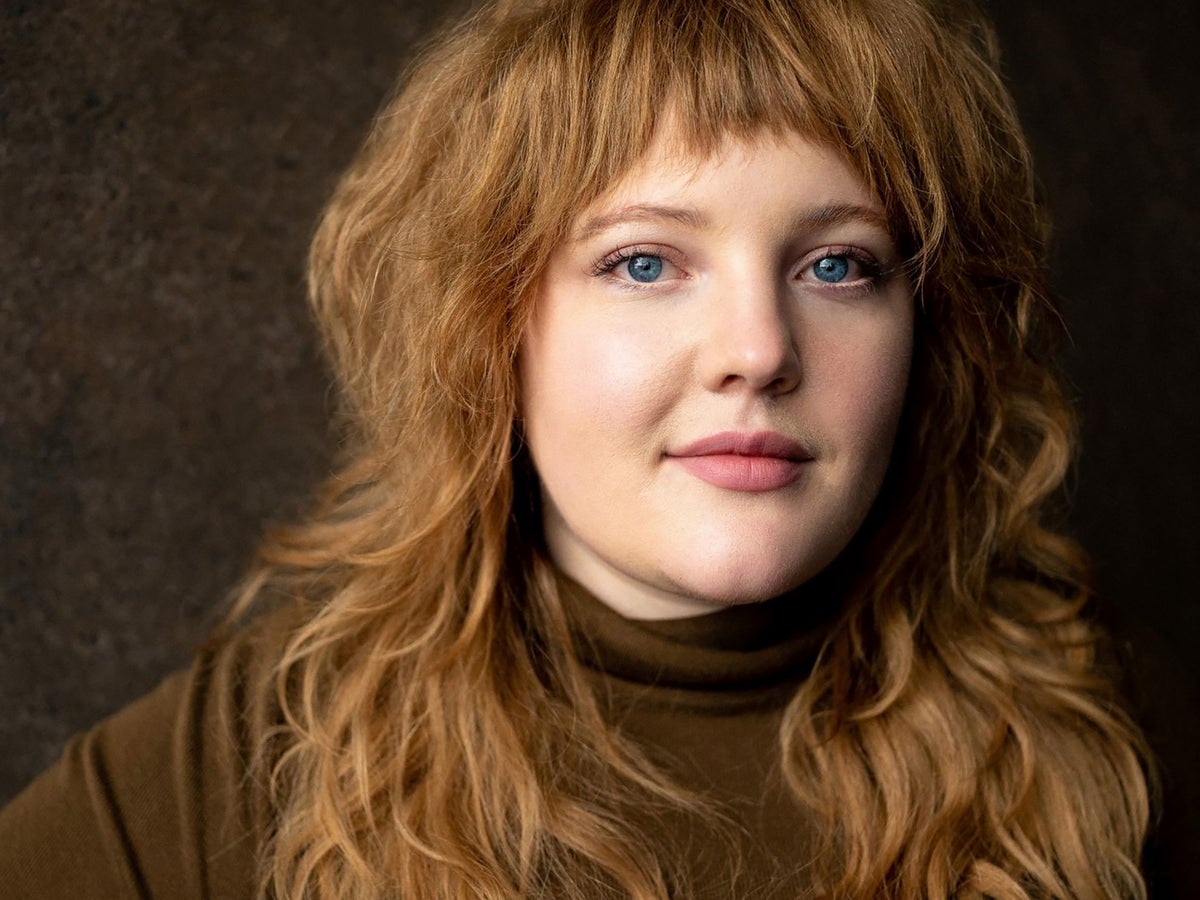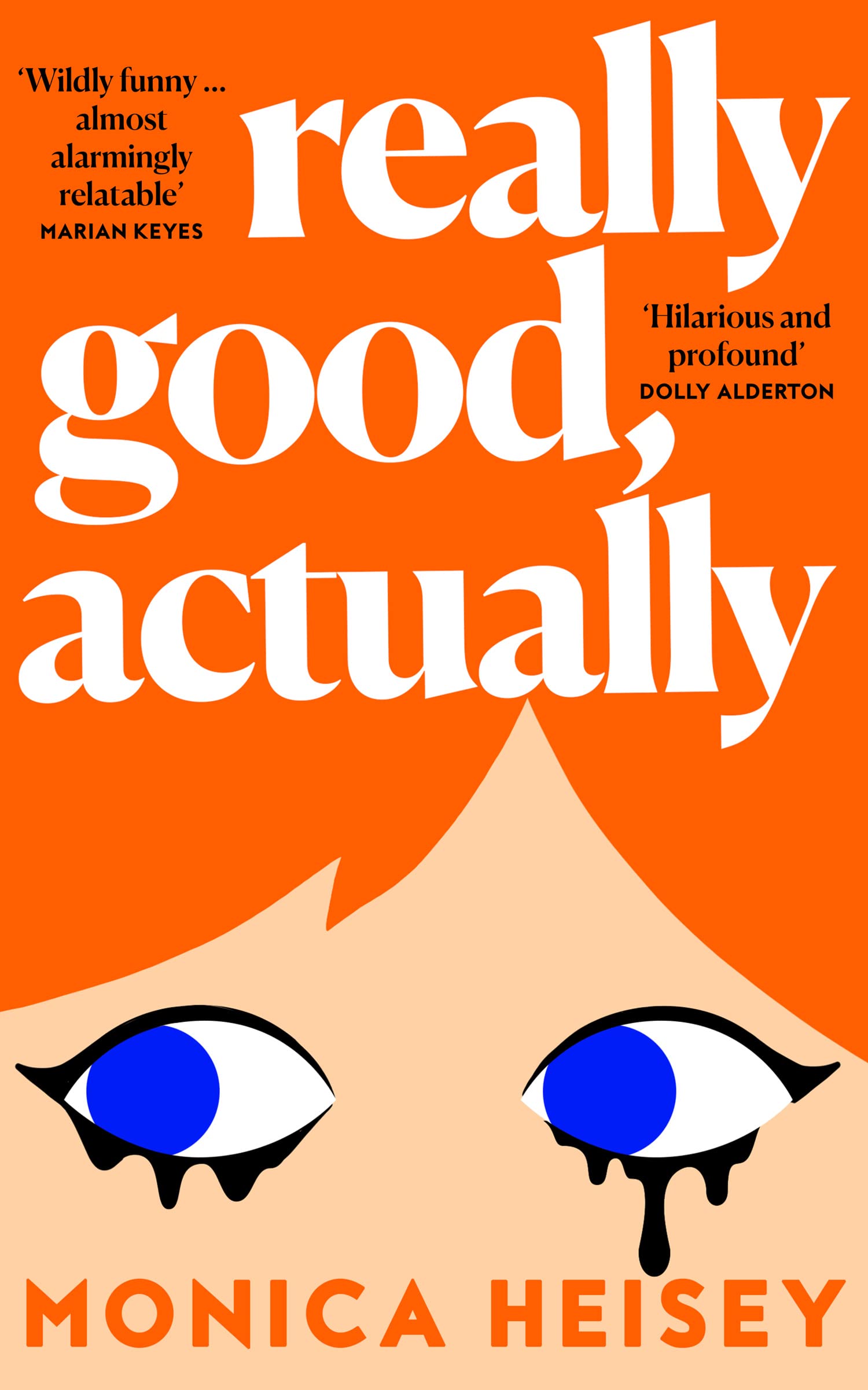
Six months after her marriage came to an end, Monica Heisey – the author of the chaotic new divorce novel Really Good, Actually – went out for drinks with a man who’d also just split from his long-term partner. She found herself asking him big, morbid questions. “Do you ever feel like you’ve just broken up with someone who’s gonna die one day, and you’d promised to love them until they did? And now you won’t?’” Her date, meanwhile, was already living with a new girlfriend. “He was like, ‘Wow, I’d never thought about that even once’.”
Heisey, a peppy Canadian with a triangular fringe and a face like Drew Barrymore’s, doesn’t know if it’s reductive to say that this particular encounter spoke to a gender gap. But she’s noticed that women seem to navigate divorce differently than men. It’s one of the reasons she wanted to write Really Good, Actually, which charts a year in the life of 28-year-old Toronto academic Maggie, whose marriage has just fallen apart. Her ex Jon, whose presence lingers ghost-like over the book, seems to move on rapidly. Meanwhile, Maggie spirals. There are failed creative projects. Endless conversations with her ex-husband’s answering machine. Disappointing three-ways.
The book’s tone – wry, modern, self-deprecating – has earned Heisey the title of one of the publishing world’s great big hopes for 2023. It’s also been optioned for television already, and a quote from Dolly Alderton decorates its cover like a Bat Signal for hot mess Instagram natives in their late twenties. That industry buzz around her, though? She’s not convinced.
“One of my sisters said the other day: ‘You’re gonna be a famous author!’” The 34-year-old shrinks in her chair. She asked her sister if she could name one young, famous author right now who would genuinely be mobbed in the street. “You can’t! Plus the book isn’t even out yet. It could still be a total flop.” We’re talking on a damp January weekday at an east London café, which is inexplicably rowdy for 10.30 in the morning. “I keep thinking they’re gonna stop using that juicer – and then they don’t!”
Part of the noise surrounding Really Good, Actually is related to the fact it’s a fiction book grounded in Heisey’s own life. Like Maggie, she also got divorced at 28. And, yes, Maggie also looks a lot like her – right down to the heap of red hair that adorns the book jacket. But Really Good, Actually absolutely isn’t a memoir. She understands, though, if people assume it’s a thinly veiled autobiography. Look at Heartburn, she says, Nora Ephron’s seminal 1983 novel about a marriage in the aftermath of an affair. “I think in some ways she made it a novel for ‘legal reasons’,” Heisey says. “And I knew there’d be people who assumed the case was the same with this book. But it’s just not, and I’m fine with it. People can misunderstand that or they can figure it out for themselves.”
I mention that people seem to seek autobiography in work that feels particularly intimate or truthful – Lucy Prebble, the writer of the dark Billie Piper comedy series I Hate Suzie, recently told The Independent that she finds it “a bit offensive” when it’s assumed she’s just lifted the show’s plots and characters straight from reality. Heisey agrees. “It’s really limiting,” she says. “And a little bit tricky and rude. Being inspired by life is something that all artists have been doing forever. So to be like, ‘Well, isn’t this sort of what happened to you?’...” She trails off. “I think people rankle at that question because it’s basically, like, ‘Did you really do anything creative here?’ And… yeah, I did.”
Maybe people can’t relate to being divorced in their twenties, but everyone can relate to feeling humiliated
Does she think that conversation is gendered? I say that Taylor Swift seems to get it a lot, too – an assumption that her lyrics are all autobiographical in nature, and therefore (inexplicably) lacking. “Maybe,” she says. “But I think it’s an age thing as well. I feel like older novelists don’t get it as much. There’s also something about responses to a debut novel where it’s like, ‘Where do you come from?’ ‘Do you just write stuff down that’s happened to you?’ It’s definitely interesting who gets asked these questions and who doesn’t, but I think people are getting a bit smarter about it.”
Heisey is a Toronto-born comedian and essayist, who’s been based in London since 2019. You may have heard some of her gags on the cult Canadian sitcom Schitt’s Creek, where she spent two years in the show’s writers’ room. After her marriage ended, she felt compelled to use her experiences in her work, but was reluctant to write a straight divorce memoir. “They’re so tricky,” she says. “Inherently it’s two people’s story. It feels a little bit cheeky to put yours to print.” (She hasn’t spoken to her ex-husband in years, by the way, and is indifferent about whether or not he’d ever read it.)
She also didn’t want to write a scorched-earth essay not unlike the ones that seem to go viral every few months now – where writers typically lambast their exes and frame themselves as largely blameless. “There’s a confessional urge in that earliest stage of a break-up,” she says. “I think that’s where some of these intense personal essays are coming from. You just feel like you’ve gotta get your story out there, that you’ve been wronged. You want those feelings validated really badly. But I needed distance from my break-up before I started writing. I didn’t want to be writing as therapy. I wanted going to therapy to be therapy.”
Unexpectedly, she found that the specifics of her divorce didn’t even matter when it came to creating a relatable story. “Maybe people can’t relate to being divorced in their twenties, but everyone can relate to feeling humiliated. Or feeling like they f****d up really bad. Or feeling like they’ll never be loved.” She also knew that the internet would be a key part of the book. Chapters are broken up by Maggie’s tragicomic Google searches, while she feels compelled, partly because of Instagram’s influence in her life, to curate her break-up. Maybe she’ll bake. Maybe she’ll start collaging. Maybe she’ll photograph herself crying every day for some faraway art project. “It’s very mired in the specific hell we’ve created in terms of trying to break up with any decorum or dignity intact,” Heisey jokes. “It’s hard to break up now – the temptation to go a bit nuts on Instagram is very strong.”

Heisey has always had a difficult relationship with the internet. It’s served as a platform for her work – and created professional connections that she’s grateful for – but she also acknowledges how destructive it can be. In 2019, she wrote an essay for The New York Times about how it’s depleted her attention span, turned her into a voyeur when it comes to her exes’ new girlfriends, and encouraged her to buy a completely pointless collection of headbands. At the end of her essay, she resolved to slow down her internet usage. Did she manage it?
“Oh, I failed totally,” she laughs today. “But it’s my resolution again this [January], too. I do charge my phone outside of the bedroom at night. That’s something. And I’m not doing TikTok, or BeReal. I’m sort of hoping Instagram will become as uncool as Facebook and then everyone will leave and I’ll just be staying in the deep end alone.”
The internet is also something that doesn’t creatively inspire her as much as reality does. She’s just finished production on her first TV show, a Sky comedy starring Aisling Bea as a reluctant stepmum, and the complexities of a blended family. “I’m most interested in relationships,” she says. “I love romantic comedies, and I feel like they get overlooked because people think, ‘Oh, it’s just about love’. But what the hell else do you want to watch something about?”
‘Really Good, Actually’ is in shops from 19 January







